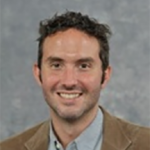
Whitney Bauman is Associate Professor of Religious Studies at Florida International University in Miami, FL. He is also co-founder and co-director of Counterpoint: Navigating Knowledge, a non-profit based in Berlin, Germany that holds public discussions over social and ecological issues related to globalization and climate change. His areas of research interest fall under the theme of “religion, science, and globalization.” He is the recipient of a Fulbright Fellowship and a Humboldt Fellowship. His publications include: Religion and Ecology: Developing a Planetary Ethic (Columbia University Press 2019), and co-authored with Kevin O’Brien, Environmental Ethics and Uncertainty: Tackling Wicked Problems (Routledge, Forthcoming Fall 2019). He is currently working on a manuscript about the 19th Century Romantic Scientist Ernst Haeckel, entitled: Rethinking Nature for a Post-Industrial Planet: Ernst Haeckel’s Non-Reductive Materialism.

California Lutheran University
Lisa E. Dahill, Professor of Religion at California Lutheran University, Thousand Oaks, CA, is a past president of the Society for the Study of Christian Spirituality and present convener of the Ecology and Liturgy Seminar of the North American Academy of Liturgy. Her writings explore the legacy of Dietrich Bonhoeffer, Lutheran liturgical spirituality, and in the last ten years a range of eco-theological subjects. She is co-editor of Eco-Reformation: Grace and Hope for a Planet in Peril (Cascade 2017) and author of the essay “Rewilding Christian Spirituality: Outdoor Sacraments and the Life of the World” in that volume, along with several other books and many other chapters, articles, and lectures. She recently co-edited an issue of Religions focusing on human religious relationships with plants and loves biking, hiking, gardening, and getting to know the local watershed in her spare time.
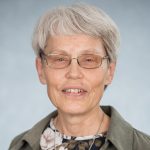
Catholic Theological Union
Sr. Mary Frohlich is a Religious of the Sacred Heart who has been on the CTU faculty since 1993. She is a noted scholar of Carmelite spirituality, with publications on Teresa of Avila, Therese of Lisieux, and John of the Cross as well as on broader issues in the tradition. An active participant in the development of Spirituality as a discipline recognized within the academy, she served as President of the Society for the Study of Christian Spirituality in 2007-2008. Current research interests include the contributions of the physical and human sciences to insight into spiritual transformation, contemplative contributions to fostering ecological conversion, and methodological issues in spirituality. In addition to teaching, she writes and leads workshops on Carmelite spirituality, spirituality as an academic discipline, and ecospirituality. She enjoys gardening, hiking, and leading outdoor retreats.

Sewanee: The University of the South
John Gatta is William R. Kenan, Jr. Professor of English at Sewanee: The University of the South, where he also served as Dean of the College of Arts and Sciences. His teaching and research have largely been concerned with American literary and cultural history before 1900—as well as with environmental literature and the interplay between religious faith and literary imagination. Before moving to Sewanee, Gatta taught for a number of years at the University of Connecticut. He has also taught at the University of Missouri, in Senegal, and in South Africa. He has published numerous articles and five books. His first book, on the colonial New England poet Edward Taylor, won a Book-of-the-Year Award from the Conference on Christianity and Literature. Other books of his include The Transfiguration of Christ and Creation; Making Nature Sacred: Literature, Religion, and Environment in America from the Puritans to the Present (Oxford UP); and, most recently, Spirits of Place in American Literary Culture (Oxford UP).
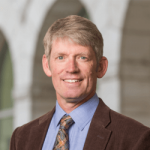
Brigham Young University
After teaching for three years at Northern Arizona University, George Handley came to BYU in 1998. His training is in Comparative Literature, focusing on the literatures of the Americas. His publications include two books on inter-american themes: “Postslavery Literatures in the Americas” (Virginia 2000), which is a study of the representation of slavery and family history in novels from the U.S. and the Caribbean, and “New World Poetics: Nature and the Adamic Imagination of Whitman, Neruda and Walcott” (Georgia, 2007), which is a critique of the imagination of nature in inter-american poetry. He has also co-edited “Caribbean Literature and the Environment” (Virginia), “Stewardship and the Creation: LDS Perspectives on the Environment” (BYU), and “Postcolonial Ecologies” (Oxford). His book “Home Waters: A Year of Recompenses on the Provo River” (U of U Press) is a work of creative non-fiction that includes nature writing, personal and environmental history, and reflections on ecotheology. He is currently working on a book, “From Chaos to Cosmos: Literature as Ecotheology.” He is also serving as associate dean. Formerly, he was chair of the Department of Humanities, Classics, and Comparative Literature and directed study abroad programs to London in 2006, the Caribbean in the summer of 2009, and London in in the Spring of 2013. He is the advisor to the student club, EcoResponse, and is active in many civic activities. You can visit his website here. He and his wife, Amy, have four children and live in Provo.
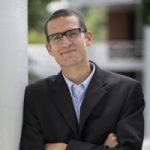
University of Virginia
Willis Jenkins lives in the Rivanna River watershed, where he serves as Professor of Religious Studies at the University of Virginia. At UVA he also teaches in the Global Sustainability major and co-directs three transdisciplinary research labs, including the Coastal Futures Conservatory. He is the author of two award-winning books, including The Future of Ethics, which won an American Academy of Religion Award for Excellence.
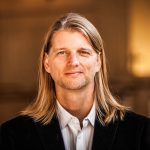
Brite Divinity School at Texas Christian University
Timothy Robinson joined the Brite faculty in 2006. His research and teaching interests include the history of Christian spirituality, mysticism, ecotheology, the intersections of spirituality and social engagement—especially ecological and environmental justice—, and spiritual direction. As a theological educator he draws on the contemplative and liturgical traditions and practices of Christianity, contemporary theology, and environmental philosophy to explore with students questions of human becoming, the nature of religious experience, the Sacred in everyday life, and planetary justice. Prior to his service at Brite, he served as pastor or associate pastor to congregations in the Christian Church (Disciples of Christ) in Louisville, KY, San Lorenzo, CA, Olathe, KS, and Lynchburg, VA.
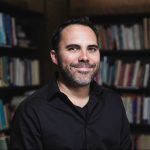
California Institute of Integral Studies
Jacob Sherman is Professor and Chair of Philosophy and Religion at the California Institute of Integral Studies Chair of the graduate program in Philosophy, Cosmology, and Consciousness at CIIS. He received his PhD in philosophy of religion from the University of Cambridge. He taught previously at King’s College London and from 2014-17 held a visiting appointment as University Lecturer in Philosophy of Religion at the University of Cambridge. He is the author of Partakers of the Divine: Contemplation and the Practice of Philosophy, and editor, with Jorge Ferrer, of The Participatory Turn: Spirituality, Mysticism, Religious Studies. The author of over two dozen articles, essays, and reviews, his writings have appeared in publications such as The Journal of the American Academy of Religion, Modern Theology, and the International Journal of Philosophy and Theology. He is currently working on a new manuscript entitled The Book of Nature: Philosophy, Theology, and the Ecological Imagination.
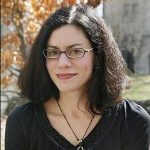
Indiana University
Lisa H. Sideris a professor of Religious Studies at Indiana University with research interests in environmental ethics at the intersection of science and religion. She is author of Environmental Ethics, Ecological Theology, and Natural Selection (Columbia University Press, 2003) and co-editor of a collection of essays on the life and work of Rachel Carson, Rachel Carson: Legacy and Challenge (SUNY, 2008). Her recent work focused on popular and scholarly efforts to recast scientific narratives of planetary and human history, including Anthropocene narratives, as shared, sacred stories for humanity. A critical appraisal of these narratives and their investment in morally problematic forms of wonder is the subject of her 2017 book Consecrating Science: Wonder, Knowledge, and the Natural World (University of California Press). With two colleagues at IU, Sideris currently leads a major research project funded by the Luce Foundation called “Being Human: Public Scholarship as Theological Anthropology.” She is working on a book about the intersection of religion, technology, and environmentalism, tentatively titled Religion and World-Making.